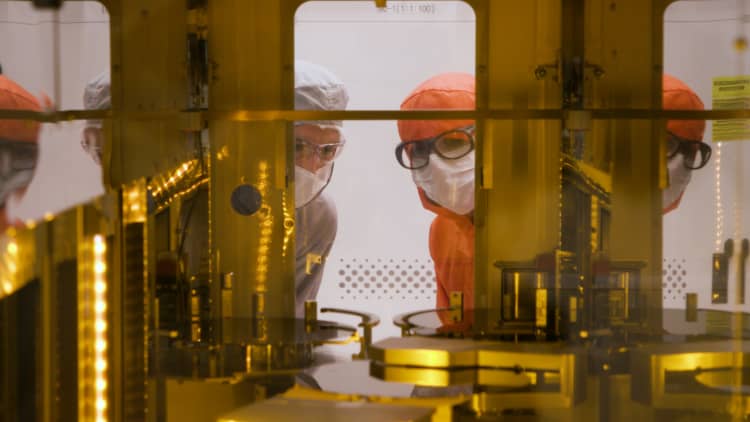The semiconductor industry is looking to hire workers in a tight labor market as competition for talent intensifies and funding from the CHIPS and Science Acts designed to stimulate domestic production continues to roll out.
The US also faces a projected shortage of up to 1 million workers in the broader economy by 2030, with generative AI adding fuel to the demand.
The U.S. chip industry is expected to face a shortage of 67,000 technicians, engineers and computer scientists by 2030, while the broader U.S. economy is set to face a gap of 1.4 million such workers, according to a 2023 study by the Semiconductor Industry Association.
A separate study by Deloitte found that the semiconductor talent crunch could worsen due to the global economic environment and ongoing supply chain issues.
A wafer sorter is seen inside GlobalFoundries' semiconductor manufacturing facility in Malta, New York, on June 18, 2024.
Cindy Schultz | Bloomberg | Getty Images
Global FoundriesSamsung, the world’s third-largest chipmaker, is on a massive talent hunt. The company has sought veteran candidates, as well as candidates from its workforce reintegration program and a women-in-construction initiative.
The company makes chips for everyday products from electronics and phones to automobiles, as well as aerospace and defense components. Major customers include General Motors And Lockheed Martin.
In 2021, the company launched the industry’s first registered apprenticeship program, a full-time, paid program with benefits, with free training for the apprentice. It takes two years or less to complete, and requires only a high school diploma or equivalent and an interest in the mechanical field. The company said about 50 apprentices have gone through the program so far. It has recruited graduates with technical associate degrees from regional community colleges and veterans transitioning from the military for the program.
Global Foundries Apple is filling hundreds of jobs at a time around the world, hiring thousands a year, a pace it expects to continue, Chief Human Resources Officer Pradeep Raman told CNBC. Maintaining the same workforce size is “not an option” for the industry as demand soars, Raman said. Needs range from technicians to product managers and corporate roles.
“That’s why we’re so aggressive when it comes to our workforce development efforts,” Raman said. “And if you can’t get traditional talent,[the solution]is to train talent across disciplines, identify alternative talent pools, people who are doing things in different areas, and show them that this is a very welcoming pool of opportunities that exists within the semiconductor industry. That’s our approach.”
GlobalFoundries' semiconductor manufacturing facility in Malta, New York, on June 18, 2024.
Cindy Schultz | Bloomberg | Getty Images
Workers also have room to advance, and training and retaining existing workers is key in this competitive environment. Morgan Woods, 28, started at GlobalFoundries’ Malta, New York, manufacturing facility as a technician in 2021. Woods has now moved into a training and development analyst role with the company, overseeing the training of technicians, engineers and management, as well as ensuring compliance. Compliance is critical as the company expands into automotive, working with General Motors, Woods said.
“As demand for microchips increases, we definitely need more manpower to help support the continued rollout of microchips and meet our daily goals,” Woods said.
Woods took advantage of a benefit GlobalFoundries launched in May that allows eligible U.S.-based employees and new hires to receive a total of $28,500 tax-free for life to pay off student debt. The benefit includes eligible loans for all types of degrees and credit-based certificate programs offered by U.S. universities and colleges. The company said it has received more than 200 applicants so far, exceeding expectations.
“By participating in this program, I will be in a much better financial position to buy a home in the next few years, as well as consider expanding my family and having children,” Woods said.
In addition to helping create roles in engineering and computer science, funding from the CHIPS and Science Act will bolster the growth of GlobalFoundries’ manufacturing facilities in New York and Vermont. In February, the company announced $1.5 billion in planned CHIPS funding to expand manufacturing capacity. The company expects the funding, along with state and local funds, to help create approximately 1,500 manufacturing jobs and 9,000 construction jobs over the life of the planned projects.
The manufacturing and construction sectors have recently faced labor shortages, and are aiming to attract new, younger employees to the field.
“We believe the challenges we face in hiring can be solved through an ecosystem approach to workforce development and making our organization one of the best places to work through the benefits offerings we provide,” Raman said.

